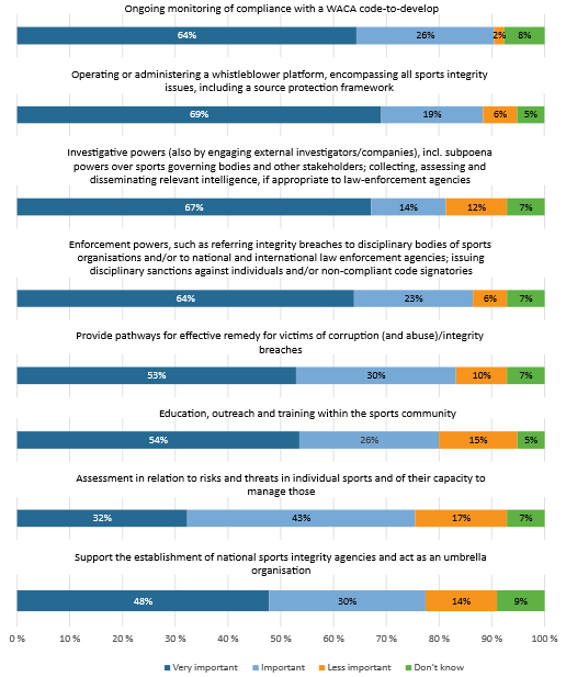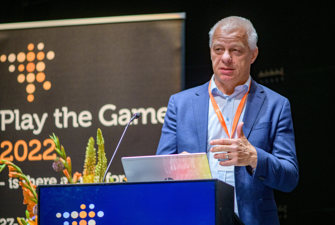Divided views on whether sports organisations should be part of an agency to combat crime in sport
Should sports organisations be part of an agency to combat crime and corruption in and through sports? It is just one of many questions raised in a report compiled for Play the Game by Grit Hartmann on the need and design of such an agency. The report forms the basis for the next step of the discussions that will take place at Play the Game 2024.
In early 2023, when Play the Game sent out a questionnaire to a select group of experts and stakeholders dealing with sports politics and integrity, the responses far exceeded expectations with massive participation from every continent, hundreds of comments with ideas and recommendations – and two models for an institution to tackle problems that have become pervasive in global sport: all sorts of corruption, abuse, match-fixing, or illegal betting.
The intention was not to make a referendum with a vote for yes or no to establishing such an international agency. Rather we asked how a 'World Anti-Corruption Agency' (as we called it then) could be pushed forward, and how it should be designed and set up to work effectively.
This corresponded to an assignment, so to speak, given at Play the Game’s 25th anniversary conference in 2022. There, the almost 20-year-old idea of independent oversight was once again put on the agenda, with a panel of experts and participants insisting Play the Game should launch a consultation process.
The assessment at the conference was fairly unanimous: Although some sports organisations such as the IOC or FIFA have become well versed in the rhetoric of 'integrity' or have adopted principles of 'good governance', the basic idea behind the rhetorics and principles was largely window-dressing, and the status quo more worrying than ever.
In addition to old-fashioned corruption – the kickbacks to feather the nests of some greedy officials – sport had proved increasingly susceptible to strategic corruption by autocrats or private wealth of dubious origin seeking to puff up their image.
Sport had at best given muted responses on how to protect athletes from systemic abuse and had done little to counter the exploding illegal betting market, often associated with match-fixing and organised crime.
And why was it even expected (as many governments still do) that sports federations should police themselves? After all, they are supposed to market their sport profitably at the same time – an inherent conflict of interest at the heart of governance.
As one of the experts at the Play the Game conference put it: “A systemic failure requires a system change”. A global regulator.
Many calls for a watchdog with a strong bite
In line with this, Play the Game posed practical questions to around 250 experts and stakeholders in early 2023. We asked how an agency to hold individuals and organisations accountable and to protect the victims could be set up, on the best path towards a global regulator, on mandate, governance, operational structure, and funding.
The report on the results titled 'ClearingSport – towards an agency countering crime and protecting integrity in world sport' was published exactly one year after the conference, in June 2023, as the first step of an open consultation process.
Nearly 200 people – four out of five – from 48 countries had responded, and moreover: They gave a stunning 840+ comments, testifying to the expertise and commitment of those who are affected by sports’ transgressions on a daily basis, whether as athlete representatives, policymakers, public prosecutors, sports officials, academics, or journalists.
The main finding: A vast majority of respondents were not just in favour of an agency (although not everyone preferred the term 'agency”'), they wanted a particularly strong watchdog that not only barks but above all has a strong bite.
This is illustrated, for example, by the survey results about the mandate of ClearingSport: How essential do respondents consider certain capabilities/responsibilities to be?

From the report 'ClearingSport – towards an agency countering crime and protecting integrity in world sport'
In global sports where whistleblowers are mostly pushed back and where top officials often do not care about enforcing existing codes/rules (or breach them with impunity), it was a logic consequence that respondents put the strongest emphasis on the agency's role as a focal point for whistleblowers and operating a source protection framework, rating it the highest in the 'very important' category.
Next come investigative powers and enforcement powers at the same level as code compliance monitoring. Likewise, the mandate to ‘provide pathways for effective remedy for victims’ received over 80 per cent approval – another almost entirely absent element in the way sport deals with various forms of crime and integrity breaches.
Notably, none of the powers suggested in the survey received less than 75 per cent support.
In addition, other mandates were suggested such as certification (of concepts and persons) or even creating a separate arbitrary tribunal linked to the agency, a reaction to CAS' dependence on sports federations.
Two models: One with and one without sports organisations
But the question of the mandate, strange as it may seem, can be regarded as secondary. Respondents to the survey were more concerned with a fundamental question: To what extent should sports organisations be involved in an agency that deals with violations by officials, breaches of self-imposed rules and sports crime? Should they even be part of this agency at all?
Accordingly, two agency models emerged throughout the comments: an intergovernmental agency and a stakeholder-legitimised agency.
The stakeholder-legitimised agency model relies on the participation of a range of stakeholders that reflect sports’ societal impact and include independent athletes’ associations as well as sports organisations.
Proponents of this option also argue for maximum independence of the agency with no influence of sports governing bodies on executive decisions. However, they note that “such an agency must have collaboration and support from the main global sports federations at the outset for any chance of success.”
In contrast, the intergovernmental model is fuelled by a great deal of scepticism as to whether sports organisations should participate. Therefore, an agency set up by a coalition of interested governments is suggested. This could be an EU agency, though this approach is met with objections from respondents from other continents.
Governments involved would agree on a set of common sports crimes, harmonise legislation to criminally prosecute the offenders, possibly agree on cross-border jurisdiction, and mandate their national law enforcement agencies to cooperate with the agency. The agency's mandate would be mainly limited to fighting sports-related crime, and by defining what constitutes sports crime, it would set standards for national sports federations, which could then be linked to public funding.
However, politicians first would have to recognise that signing declarations and non-binding partnership agreements only preserves the status quo in the interests of sports organisations (which often do not align with the interests of athletes or fans), and that national integrity bodies working on national legislation can hardly keep up with a globalised multi-billion-dollar business.
Roles in an intergovernmental model
The two models are not entirely exclusive; the intergovernmental agency might be open at some point for sports federations to sign a code that, however, is offered by the governments or, as it was put: “Provisions could be made for non-members to participate in and eventually join the coalition upon satisfying specified criteria.”
It is worth noting that many respondents to Play the Game’s survey outlined 'guiding principles' to determine the work of the agency: Independence would be key, to be ensured by, among other things, skills-based, non-representative oversight bodies and executives.
The World Anti-Doping Agency (WADA), perceived as dominated by sports federations, inspired numerous comments and reflections on how to irrevocably enshrine independence in the new agency – if not the intergovernmental model is preferred for this very reason.
Furthermore: The new agency should maintain a human rights-conscious approach, pay particular attention to victims and respect geographical and gender diversity throughout its own structure.
Although a survey obviously cannot provide a full recipe for combating all forms of misconduct or crime in and through sport, there are certainly good suggestions on the table now, including first ideas on funding.
Many relevant as well as surprising questions were asked and need to be addressed. To name just a few:
- Should a global regulator develop a full code of conduct and governance or instead – and at least for a start – focus on the enforcement of existing rules, be they sports regulations, civil or criminal law?
- What framework for cooperation with law enforcement can be set?
- How can an agency be built up gradually?
- Should sports’ sponsors or television rights holders play any role in it?
Certainly, the results of a survey – however profound and resourceful they are – cannot sway governments to change the rules of engagement and justify the public funds that are invested into sports by putting the 'autonomy' of sport on a new footing.
Sports organisations, who have so far fought tooth and nail against independent oversight, will not be won over easily either.
But the idea has found new supporters, not least among athletes, and it was not without reason that Play the Game has labelled the ClearingSport report as just the first step in an open consultation process.
At Play the Game 2024, two sessions will add input to the consultation round, and it will then be decided how to proceed towards creating a set of recommendations for decision-makers to act upon.

